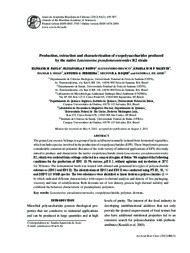Production, extraction and characterization of exopolysaccharides produced by the native Leuconostoc pseudomesenteroides R2 strain.
Production, extraction and characterization of exopolysaccharides produced by the native Leuconostoc pseudomesenteroides R2 strain.
Autoria: PAULO, E. M.; BOFFO, E. F.; BRANCO, A.; VALENTE, A. M. M. P.; MELO, I. S. de; FERREIRA, A. G.; ROQUE, M. R. de A.; ASSIS, S. A. de
Resumo: ABSTRACT: The genus Leuconostoc belongs to a group of lactic acid bacteria usually isolated from fermented vegetables, which includes species involved in the production of exopolysaccharides (EPS). These biopolymers possess considerable commercial potential. Because of the wide variety of industrial applications of EPS, this study aimed to produce and characterize the native exopolysaccharide strain Leuconostoc pseudomesenteroides R2, which was isolated from cabbage collected in a semi-arid region of Bahia. We employed the following conditions for the production of EPS: 10.7% sucrose, pH 8.2, without agitation and incubation at 28°C for 30 hours. The fermentation broth was treated with ethanol and generated two types of polysaccharide substances (EPS I and EPS II). The identification of EPS I and EPS II was conducted using FT-IR, 1H, 13C and DEPT-135 NMR spectra. The two substances were identified as linear dextran ? polysaccharides (1 ? 6) which indicated different characteristics with respect to thermal analysis and density of free packaging, viscosity and time of solubilization. Both dextrans are of low density, possess high thermal stability and exhibited the behavior characteristic of pseudoplastic polymers.
Ano de publicação: 2012
Tipo de publicação: Artigo de periódico
Unidade: Embrapa Meio Ambiente
Palavras-chave: Bactéria, Biopolymers, Exopolysaccharide, Leuconostoc pseudomesenteroides, Polymer, dextran
Observações
1 - Por padrão são exibidas publicações dos últimos 20 anos. Para encontrar publicações mais antigas, configure o filtro ano de publicação, colocando o ano a partir do qual você deseja encontrar publicações. O filtro está na coluna da esquerda na busca acima.
2 - Para ler algumas publicações da Embrapa (apenas as que estão em formato ePub), é necessário ter, no celular ou computador, um desses softwares gratuitos. Sistemas Android: Google Play Livros; IOS: iBooks; Windows e Linux: software Calibre.
Acesse outras publicações
Acesse a Base de Dados da Pesquisa Agropecuária (BDPA) para consultar o acervo completo das bibliotecas da Embrapa.

